#the marriage of heaven and hell
Explore tagged Tumblr posts
Text


research/essay writing 26.09 THU
researching for my english essay at the library today!! writing on the romantics/william blake. ultimately, i’m hapoy i went with blake and this art/literary movement. the discussion he makes surrounding religion in ‘the marriage of heaven and hell’ is reallt captivating and interesting. and the scholarship is nice to read as well!!
i’m just doing some quick research to see how strong my current arguments are represented, or if i need to alter them, or find more scholarship to either argue with or against
also going to the library was a great decision, i actually started writing the bloody thing.
#studyblr#study blog#student#studying#uni#uni student#univeristy#flora studies#study motivation#study#literary studies#lit#english lit#english literature#the romantics#william blake#the marriage of heaven and hell
187 notes
·
View notes
Text
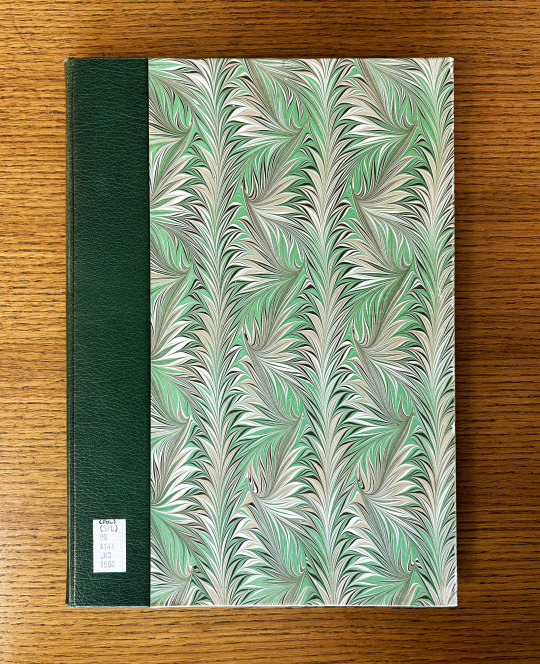
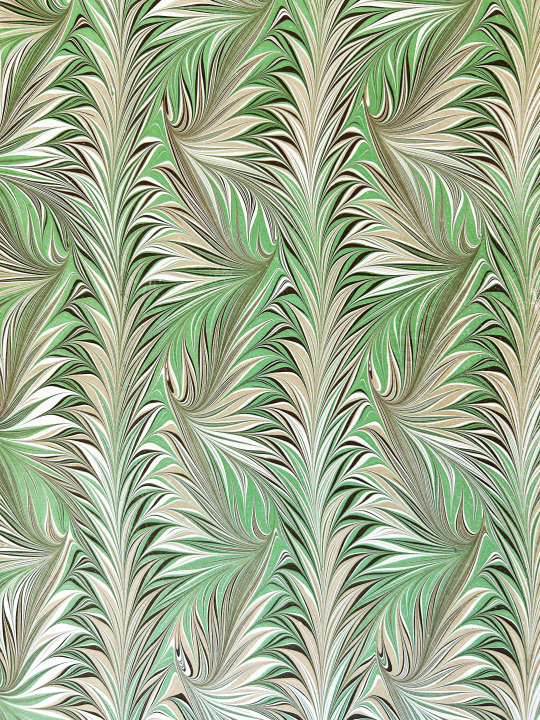
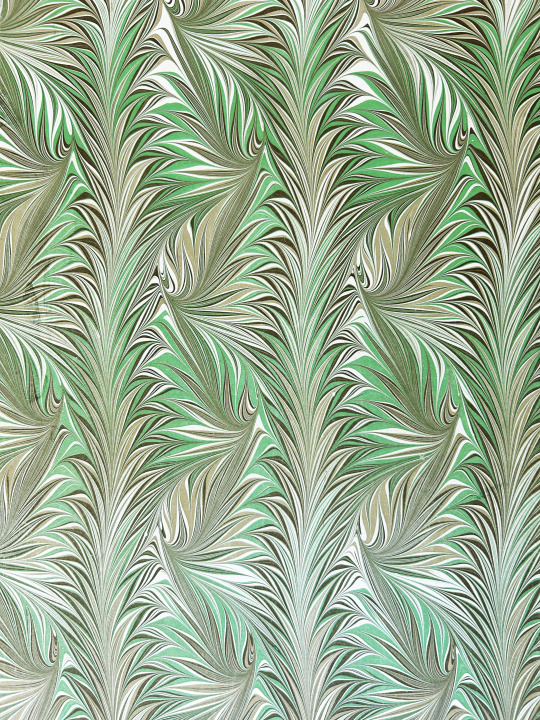
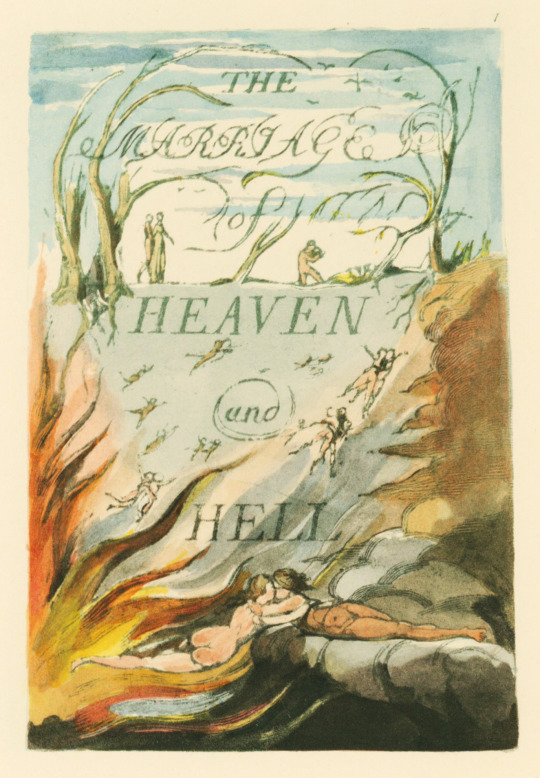
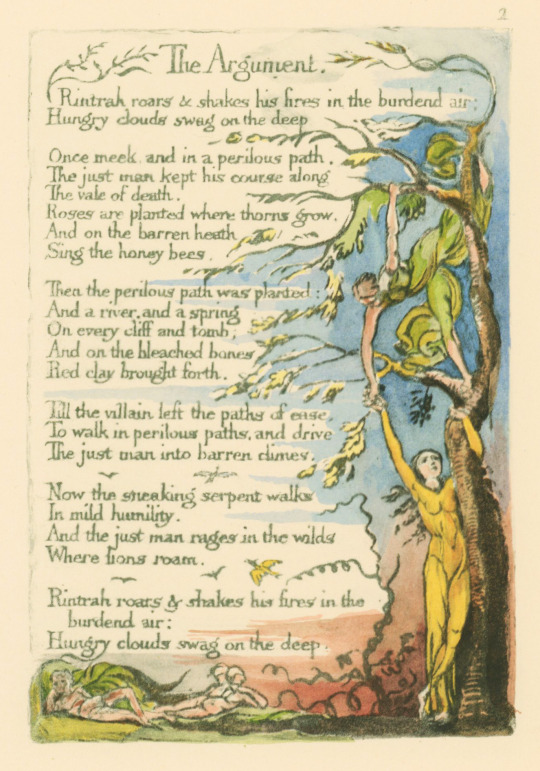
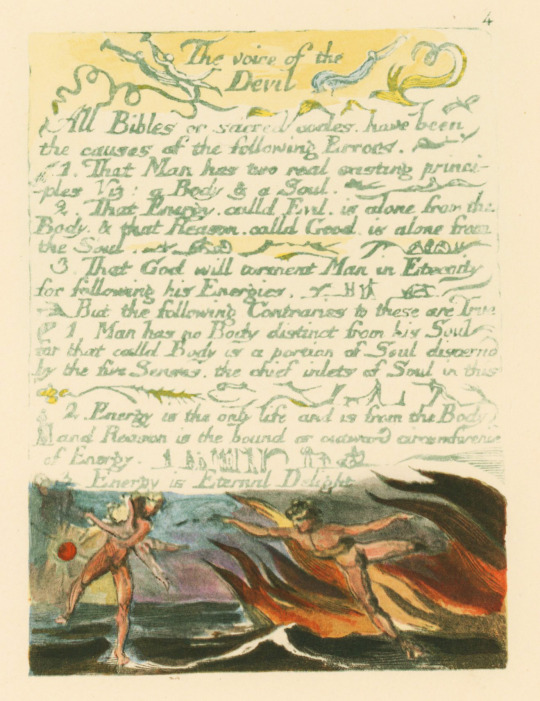
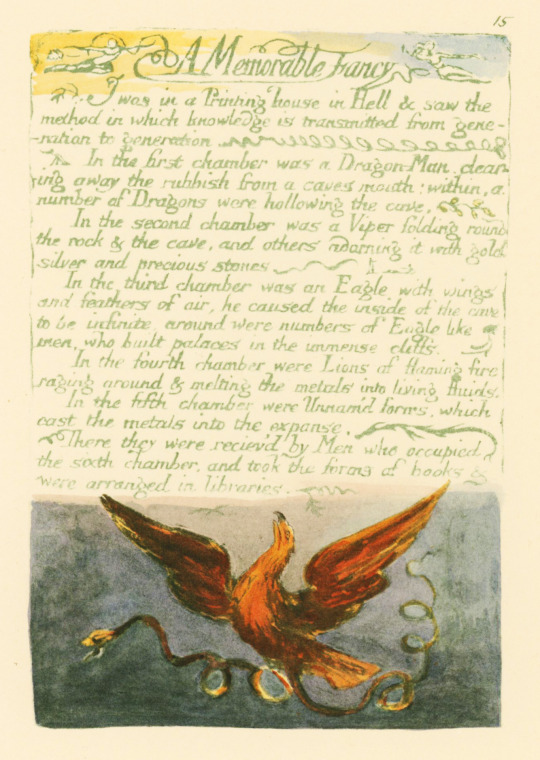
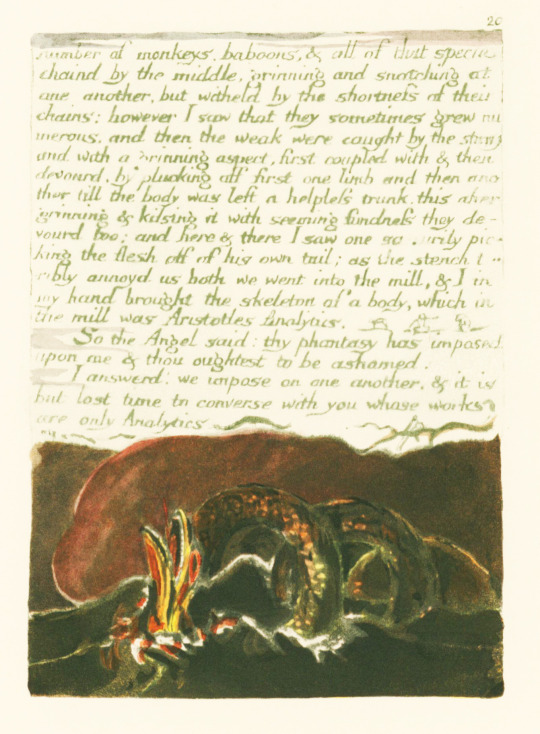
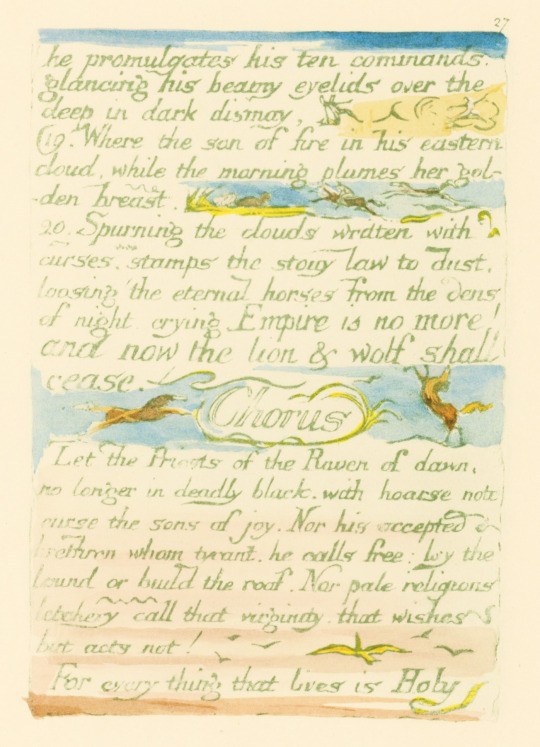
Marbled Monday
This Marbled Monday we return to the publications of the Trianon Press and their editions of English poet, painter, and printmaker William Blake's (1957-1827) works. Why so much Trianon Press and William Blake lately? Well, because we had a whole bunch of it out recently and couldn't pass up the opportunity to post the beautiful marbling used in binding each volume. This is Blake's The Marriage of Heaven and Hell in a facsimile edition published by the Trianon Press in 1960 for the William Blake Trust.
The marbling is the same pattern used for Trianon Press's edition of Visions of the Daughters of Albion, but in a green color palette instead of orange. This pattern can be called Octopus or Whirl and was likely not created until the 20th century.
View more posts about Trianon Press publications.
View more Marbled Monday posts.
-- Alice, Special Collections Department Manager
#Marbled Monday#marbled paper#Trianon Press#William Blake#The Marriage of Heaven and Hell#Octopus pattern#Whirl pattern#marbling#William Blake Trust
89 notes
·
View notes
Text

#Sparkstember 2024, day 17 - Plagiarism. 'Symmetry,' digital collage.
#sparkstember 2024#ron mael#russell mael#sparkstember#sparks day 17#sparks fanart#plagiarism#heaven and hell#the marriage of heaven and hell
19 notes
·
View notes
Text
William Blake and Good Omens - an intertextual analysis
Please note: I did another version of this and posted it, but it was quite hurried, way too short, and was incorrect in a number of ways so I deleted it. However it had already been reblogged by the time i did so. If you happen to see another version of this meta that's not the right one, this is the version I'm happy with!
After my previous post re William Blake and Good Omens did so well, and so many people showed an interest I've decided to do a more in depth piece. This is focused upon the TV version of Good Omens, not the book.
Please don't tag Neil in this - although it's mostly textual analysis I do a very small amount of S3 theorising, and I know he doesn't want to see that.
I am in no way suggesting that Neil and Terry specifically wrote Good Omens with Blake in mind, I honestly just wanted an excuse to write more about Blake because I love his work so much, and I thought it would be interesting to try and apply some intertexuality since the works will contain similar themes, both being about God, religion, humanity, and angels and demons.
I also should stress that I am not an expert on Blake, there are people far more qualified to comment on him than I. I'm just a former literature student who loves his work.
There have been many different interpretations of Blake's work over the years, so it's completely fine to disagree with someone else's ideas about it, as with any work of art or literature. And although this piece is likely to be long, I'll barely be able to scratch the surface of all the possible meanings that could be ascribed to it.
Much like the old adage that if someone claims to understand quantum physics they're lying, I'm not sure anyone can truly fathom the full meaning of Blake's philosophy (especially in his later prophetic works, fuuuuuuck those beasts....), so if you're confused by him don't be discouraged, that's perfectly normal!
That being said, I wish to discuss the parallels between Good Omens and The Marriage of Heaven and Hell, my personal favourite and probably the most accessible of his longer works.
"Without contraries is no progression. Attraction and Repulsion, Reason and Energy, Love and Hate, are necessary to Human existence. From these contraries spring what the religious call Good & Evil. Good is the passive that obeys Reason. Evil is the active springing from Energy. Good is Heaven. Evil is Hell."
This excerpt is from near the opening and sets out the central idea of the work - that there is an essential duality to humanity, and each person is a combination of extremes. These extremes are not at war with each other, but rather are equally necessary, hence the "marriage" of the title. "The Marriage of Heaven and Hell" is a metaphor for the human experience.
Consistently throughout The Marriage... Blake refers to the two extremes as Reason and Energy. These terms could be construed in a number of different ways: thought versus emotion, mental versus physical, restraint versus desire, temperance versus excess, caution versus impulsiveness, and following the rules versus free will.
Blake's use of the word "Reason" in this context may be somewhat confusing, however he likely chose it because of his negative feelings towards science and the Age of Enlightenment. Blake saw literal visions of angels and prophets and the divinity of all creation, and hated that science reduced everything to formulas, calculations, and materialism, leaving the world bereft of wonder. "Art is the Tree of Life. Science is the Tree of Death" as he put it.
His ideas about "reason" are best expressed by his painting "Newton". Though inspired by the scientist, it is not a portrait - instead it depicts a figure deeply engrossed in scientific drawings and calculations, totally ignoring the beauty all around him - see below.
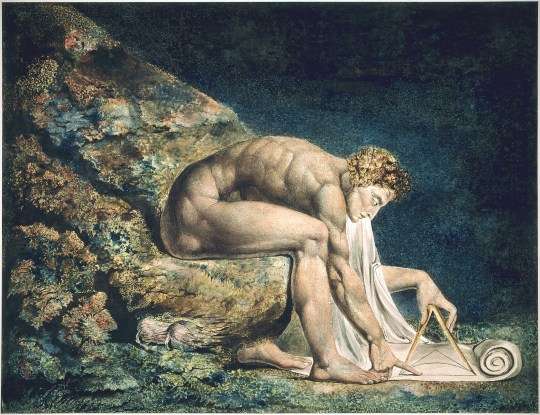
In the context of The Marriage... Reason is "passive" because it involves thought, caution, self-restraint, and doing what you are told, all states which block action. Energy is "active" because it is physical, emotional, impulsive and allows you to act based on your own choices and desires. It's quite clear that Blake feels "energy" is the preferable state - he tells us as much in the next section:
"The Voice of the Devil
All Bibles or sacred codes, have been the causes of the following Errors. 1. That Man has two real existing principles Viz: a Body & a Soul. 2. That Energy, call'd Evil, is alone from the Body, & that Reason, call'd Good, is alone from the Soul. 3. That God will torment Man in Eternity for following his Energies. But the following Contraries to these are True. 1. Man has no Body distinct from his Soul; for that call'd Body is a portion of Soul discern'd by the five Senses, the chief inlets of Soul in this age. 2. Energy is the only life and is from the Body and Reason is the bound or outward circumference of Energy. 3. Energy is Eternal Delight."
So the body is an aspect of the soul, not separate from it, Energy comes from the body, it is Reason which places limits upon Energy, but Energy is eternal delight. Physicality, desire, impulsiveness, emotion, sensual pleasure and free will are not wrong or evil, they are aspects of the human soul and it is from them that we derive our enjoyment of life.
This does not necessarily mean that Reason is always bad. After all, Blake tells us that both are necessary for human existence. Sometimes temperance, caution and thought before action are required. But Reason becomes negative when it "usurps its place and governs the unwilling", i.e. when it completely supplants Energy and becomes the sole guiding factor, forcing passivity.
The Angels of The Marriage... are governed by "systematic reasoning", therefore they are wholly creatures of Reason. They are also "all religious" meaning they believe the "errors" stated above. His Devils by contrast "hate religion" meaning they believe the "contraries", which are the true statements according to Blake. It does not necessarily follow that they are wholly governed by Energy, merely that they believe Energy is "eternal delight".
It is worth noting at this point that Blake saw God and religion as totally separate. For Blake, "God" is that connection with divine wonder which was integral to his life; he tells us plainly that "all deities reside in the human breast" and that "the voice of honest indignation is the voice of God". In other words all humans have a direct and intuitive link with God and don't require the church, Priests, or a religious framework and adherence to a set of rules in order to reach moral decisions. These rules exist only to "enslave the vulgar".
The importance of this ability to make one's own choices about a moral course of action is shown by one of the "Memorable Fancy" sections of The Marriage...
Blake relates how a Devil is able to use an Angel's "systematic reasoning" against them:
"if Jesus Christ is the greatest man, you ought to love him in the greatest degree; now hear how he has given his sanction to the law of ten commandments: did he not mock at the sabbath, and so mock the sabbaths God? Murder those who were murder'd because of him? Turn away the law from the woman taken in adultery? Steal the labor of others to support him? Bear false witness when he omitted making a defence before Pilate? Covet when he pray'd for his disciples, and when he bid them shake off the dust of their feet against such as refused to lodge them? I tell you, no virtue can exist without breaking these ten commandments; Jesus was all virtue, and acted from impulse, not from rules."
The Angel has no way to refute the "reasoning" that Jesus was governed by Energy and "impulse", i.e. his own morality, the "voice of righteous indignation", not reasoning and the rules laid down by Heaven. And because Jesus is the Messiah he must be virtuous, therefore Energy is virtuous. The Angel immediately allows himself to be consumed by fire and is resurrected as a Devil.
How can these concepts apply to the world of Good Omens? This was where my first draft was totally incorrect, as I tried to transfer Blake's ideas about Angels and Demons and Heaven and Hell wholesale, applying "reason" to Aziraphale and Heaven and "energy" to Crowley and Hell. In fact the divide is slightly different in the GO-verse: Crowley and Aziraphale *both* represent Energy, and it is Heaven and Hell that act according to Reason.
At first glance Aziraphale may appear to toe the line - he needs creative application of the rules to make him comfortable with trying to avert the apocalypse, and when he doesn't like the way matters are being handled by the Archangels he seeks a higher authority and goes straight to God. He'd clearly prefer someone to be confirming the rightness of his actions for him. However this doesn't mean that he won't act on his own.
Immediately upon his introduction to the story he has given away his flaming sword, an action that he took impulsively because he felt it was right, not because someone told him to. It bothers him, but he does it anyway.
In the Job storyline, though he initially looks for some loophole within the rules that will allow him to save Job's children, in the end he directly goes against Heaven to do it, even though he believes he is going to Fall and become a Demon for having done so.
Though he resists it and exhausts all other possible avenues first, he eventually does take an active role in averting the apocalypse in S1.
He hides Jim at great personal risk to himself and against the will of both Heaven and Hell, again because he feels it is the right thing to do.
He is therefore perfectly capable of independent action from a position of "righteous indignation".
On a more basic level, he enjoys worldly pleasures, which all come from "energy" according to Blake's philosophy. Food and drink most obviously, but also books, music, dancing, theatre, art and so on.
Crowley is more easy to place as acting from Energy - in spite of the obvious aesthetic differences between them, he also loves worldly pleasures. Alcohol and coffee, snazzy clothing, driving his car with Queen blaring on the stereo, going to lunch with Aziraphale, Shakespearean comedies. All things he isn't supposed to want or need, and which baffle other Demons, in the same way that Aziraphale's desire for food baffles the Angels.
And he's absolutely willing to act according to his own moral impulses when they conflict with Hell's orders (or Heaven's), be it saving Job's children, ensuring that Elspeth doesn't die by suicide, or averting the apocalypse. Yes, he'll try to hide his "good" actions in order to avoid punishment by Hell, but he's firmly "on his own side".
Conversely, Heaven and Hell are both part of the structure of religion in this story, are strictly adherent to a set of rules, and their inhabitants appear to have no real desires of their own, other than possible advancement within the systems they uphold. They are "passive" in that their functions allow the status quo to continue and the "great plan" to unfold as they believe it is meant to, even though each side expects a different outcome.
Again, applying Blake's philosophy, I would say the reason for this is that "energy is from the body". Crowley and Aziraphale have both been given bodies in order that they can exist on earth, and *have* existed on earth for 6000 years, therefore "energy" - physical pleasures and free thinking - have become a part of who they are.
On a more fundamental level, possession of a body can be equated to humanity, and humanity has been shown as the most powerful force of all in this story, its influence having led to Adam becoming "human incarnate", and thus acting according to what he feels is right, instead of fulfilling the function he was destined for.
Heaven and Hell contain no material objects, and the Angels and Demons are spiritual beings, having no bodies, so they are not open to energy, and therefore are wholly governed by Reason, and the preservation of the religious structures within which they exist. Structures which, as for Blake, may not actually have anything to do with God herself. In S1 she is a distant observer, clearly aware through her narration of all that is going on, but not interceding in any way. In S2 she is barely present save for her voice being heard briefly in Job, and overlaid with Gabriel's on two occasions.
Bearing all this in mind, what predictions can we make regarding S3 by applying Blake's philosophy?
"The ancient tradition that the world will be consumed in fire at the end of six thousand years is true, as I have heard from Hell.
For the cherub with his flaming sword is hereby commanded to leave his guard at [the] tree of life, and when he does, the whole creation will be consumed and appear infinite and holy, whereas it now appears finite and corrupt.
This will come to pass by an improvement of sensual enjoyment."
The parallels of the cherub with his flaming sword, and the passage of 6000 years should be obvious to anyone reading this - they have of course been lifted directly from the Bible as they are in GO.
I have read some metas which speculated that Aziraphale's bookshop, or perhaps Earth itself, is a metaphorical stand-in for Eden or The Tree of Life. Aziraphale has been commanded to leave his "Eden" and will now be instrumental in causing the whole of creation to become infinite and holy, but Blake tells us this will be done by an improvement of sensual enjoyment, which arises from Energy not Reason.
Sensual enjoyment is something which is intrinsic to Aziraphale's character, and this could make his placement in Heaven very important.
Putting aside all the "final fifteen" theories and taking matters at face value, Aziraphale tells us that if he's in charge he can make a difference - he needs to subvert the system from the inside out. The most subversive thing of all could be that a sensualist who acts according to "the voice of moral indignation" and "Energy" has become the supreme Archangel. We have seen in Blake how a realisation that Energy could be virtuous was enough to convert an Angel into a Devil (incidentally, does the image of an Angel being consumed by fire and emerging as a Devil seem familiar at all...)
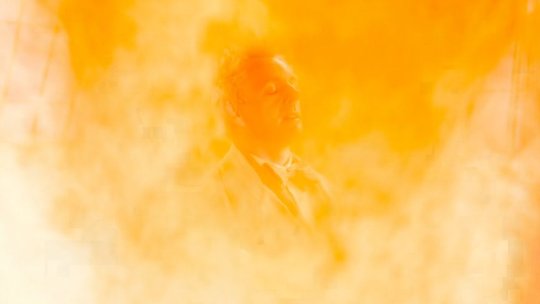
We may have seen the beginnings of this already. Gabriel and Beelzebub became open to Energy from such little things as visiting earth, spending time in one another's company, and their mutual enjoyment of a song, which has given them wants and desires beyond those dictated by Heaven and Hell. This is enough to make them wish to leave their roles behind.
It's possible that the same may happen with Muriel. They haven't yet imbibed food or drink, but they have shown an enjoyment of books, which are an earthly pleasure, and open the reader up to new ideas and ways of thinking.
Of course, this would lead to questions regarding the Metatron's statement that he has "ingested things", and whether this means he is acting from reason or energy. Of course the simplest explanation is that it is a manipulation tactic, and he is lying about having done so, but if true that statement has some interesting implications. However, this is now super-long and I'm out of juice, so will leave others to speculate. I may return to this in the future!
There we go, hope you enjoyed. I doubt this will reach nearly as many people as my first Blake post, but if a few find it of interest then my work is done!
#good omens#good omens 2#go2#crowley#aziraphale#good omens tv#good omens meta#good omens s2#good omens season 3#good omens s3#good omens brainrot#william blake#the marriage of heaven and hell#poetry#poems and poetry#books and reading#english literature#Textual analysis#intertextuality#good omens theories#good omens thoughts
45 notes
·
View notes
Text


William Blake, The Marriage of Heaven and Hell
#william blake#the tudors#poetry#literature#quotes#the marriage of heaven and hell#desire#the tudors s4
12 notes
·
View notes
Text
I was in a Printing house in Hell & saw the method in which knowledge is transmitted from generation to generation.
William Blake, from A memorable fancy (in ‘The Marriage of Heaven and Hell’, self-printed 1790)

16 notes
·
View notes
Text
Word of advice to my fellow English students on tumblr: if you are thinking of writing an essay on William Blake,
DON’T
You will get so lost in his esoteric bullshit you forget what the point of your essay even was and your head hurts.
#don’t do it#speaking from experience#english essay#english student#student problems#english studyblr#william blake#the marriage of heaven and hell
9 notes
·
View notes
Text
What is now proved was once only imagin'd.
William Blake, The Marriage of Heaven and Hell
5 notes
·
View notes
Quote
Without contraries is no progression. Attraction and repulsion, reason and energy, love and hate, are necessary to human existence.
William Blake, The Marriage of Heaven and Hell
#quote#quotes#life quotes#wisdom#william blake#the marriage of heaven and hell#humanity#personal development#personal growth#human nature#love#hate
23 notes
·
View notes
Text


Plates 14 and 27.
The Marriage of Heaven and Hell, William Blake.
From the blakearchive.
5 notes
·
View notes
Text
Good Omens Fic / Ficlet Prompts
William Blake’s “Proverbs of Hell”, part of his mad and delightful The Marriage of Heaven and Hell, contains sixty-nine sayings. (All together now: nice!) The more I read them, the more I think they would be perfect prompts for Good Omens fic / ficlets, so here they are in the hopes that others might see and enjoy.
In seed-time learn, in harvest teach, in winter enjoy.
Drive your cart and your plough over the bones of the dead.
The road of excess leads to the palace of wisdom.
Prudence is a rich ugly old maid courted by Incapacity.
He who desires, but acts not, breeds pestilence.
The cut worm forgives the plough.
Dip him in the river who loves water.
A fool sees not the same tree that a wise man sees.
He whose face gives no light shall never become a star.
Eternity is in love with the productions of time.
The busy bee has no time for sorrow.
The hours of folly are measured by the clock, but of wisdom no clock can measure.
All wholesome food is caught without a net or a trap.
Bring out number, weight, and measure in a year of dearth.
No bird soars too high if he soars with his own wings.
A dead body revenges not injuries.
The most sublime act is to set another before you.
If the fool would persist in his folly he would become wise.
Folly is the cloak of knavery.
Shame is Pride’s cloak.
Prisons are built with stones of law, brothels with bricks of religion.
The pride of the peacock is the glory of God.
The lust of the goat is the bounty of God.
The wrath of the lion is the wisdom of God.
The nakedness of woman is the work of God.
Excess of sorrow laughs, excess of joy weeps.
The roaring of lions, the howling of wolves, the raging of the stormy sea, and the destructive sword, are portions of Eternity too great for the eye of man.
The fox condemns the trap, not himself.
Joys impregnate, sorrows bring forth.
Let man wear the fell of the lion, woman the fleece of the sheep.
The bird a nest, the spider a web, man friendship.
The selfish smiling fool and the sullen frowning fool shall be both thought wise that they may be a rod.
What is now proved was once only imagined.
The rat, the mouse, the fox, the rabbit watch the roots; the lion, the tiger, the horse, the elephant watch the fruits.
The cistern contains, the fountain overflows.
One thought fills immensity.
Always be ready to speak your mind, and a base man will avoid you.
Everything possible to be believed is an image of truth.
The eagle never lost so much time as when he submitted to learn of the crow.
The fox provides for himself, but God provides for the lion.
Think in the morning, act in the noon, eat in the evening, sleep in the night.
He who has suffered you to impose on him knows you.
As the plough follows words, so God rewards prayers.
The tigers of wrath are wiser than the horses of instruction.
Expect poison from the standing water.
You never know what is enough unless you know what is more than enough.
Listen to the fool’s reproach; it is a kingly title.
The eyes of fire, the nostrils of air, the mouth of water, the beard of earth.
The weak in courage is strong in cunning.
The apple tree never asks the beech how he shall grow, nor the lion the horse how he shall take his prey.
The thankful receiver bears a plentiful harvest.
If others had not been foolish we should have been so.
The soul of sweet delight can never be defiled.
When thou seest an eagle, thou seest a portion of Genius. Lift up thy head!
As the caterpillar chooses the fairest leaves to lay her eggs on, so the priest lays his curse on the fairest joys.
To create a little flower is the labour of ages.
Damn braces; bless relaxes.
The best wine is the oldest, the best water the newest.
Prayers plough not; praises reap not; joys laugh not; sorrows weep not.
The head Sublime, the heart Pathos, the genitals Beauty, the hands and feet Proportion.
As the air to a bird, or the sea to a fish, so is contempt to the contemptible.
The crow wished everything was black; the owl that everything was white.
Exuberance is Beauty.
If the lion was advised by the fox, he would be cunning.
Improvement makes straight roads, but the crooked roads without Improvement are roads of Genius.
Sooner murder an infant in its cradle than nurse unacted desires.
Where man is not, nature is barren.
Truth can never be told so as to be understood and not to be believed.
Enough! or Too much.
If you do end up inspired by any of these, please tag me? I'd love to see what you come up with!
#good omens#crowley#aziraphale#good omens fanfiction#fanfiction prompts#william blake#the marriage of heaven and hell#proverbs of hell
2 notes
·
View notes
Text

William Blake “The Marriage of Heaven and Hell”
Text ID:
Plate 14
The ancient tradition that the world will be consumed in fire at the end of six thousand years is true. as I have heard it from Hell.
For the cherub with his flaming sword is hereby commanded to leave his guard at the tree of life, and when he does, the whole creation will be consumed, and appear infinite. and holy whereas it now appears finite & corrupt.
4 notes
·
View notes
Text
#thinking about the first 10 episodes of this show (all I will ever watch) again#wiseguy#vinnie terranova#sonny steelgrave#v#video#tv shows#soupy's#ray sharkey#ken wahl#the marriage of heaven and hell#wiseguy (1987 - 1990)#ik the punchline takes so long to get there but I just need this part for my sentimental self.
11 notes
·
View notes
Text
He who desires but acts not, breeds pestilence.
William Blake, The Marriage of Heaven and Hell
3 notes
·
View notes
Text
Collage box collection
After discovering that I had a reasonably big stash of interesting flyers, greetings cards, guidebooks and other bits of ephemera, and seeing this tutorial, I was really inspired to use it all for something.
This was helped by the fact that recently I've found a lot of really nice wooden boxes in charity shops for very cheap - all the ones pictured here were £2. Either I've been extremely lucky, or these things turn up very often and I just haven't been looking for them.
I've posted about some of these previously (here and here), but they were only half done and these pictures are better! Plus there is one new one.
First was this wooden chocolate box. Before...

And after!
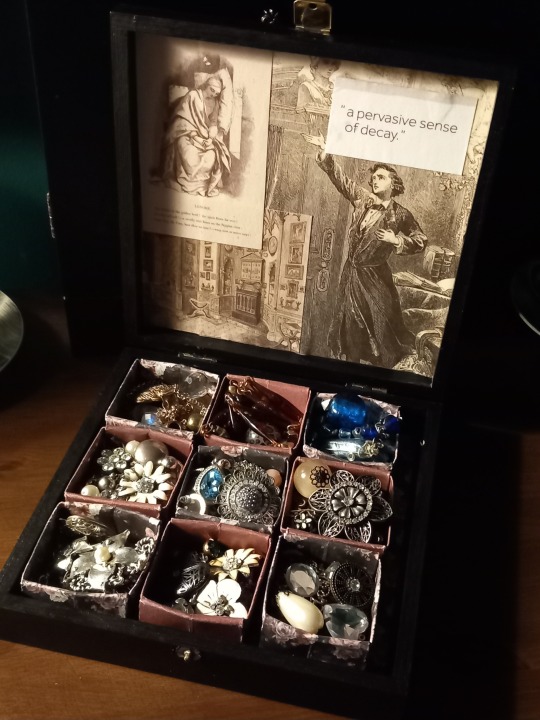
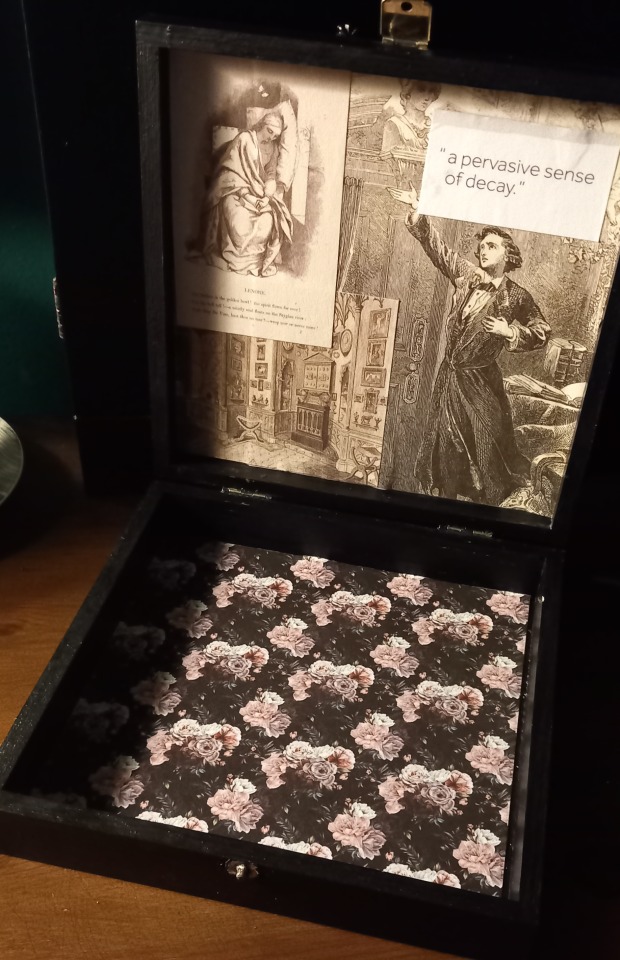
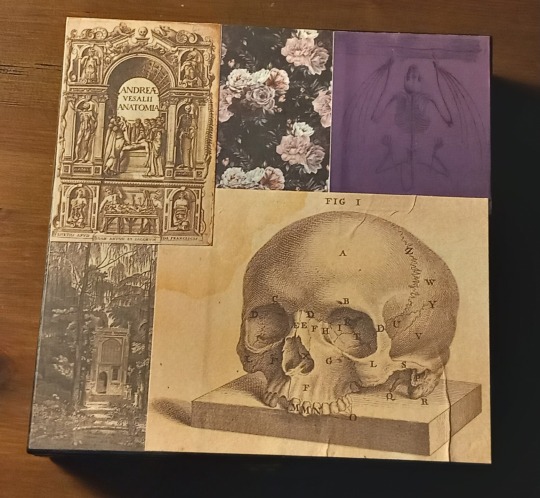
You can tell this is my first one as I oversatured the paper with Mod Podge, leading to it bubbling and creasing, but for a first attempt I don't think it's bad at all.
All the pictures I used were taken from an exhibition guide for an event I went to called "Exploring the Gothic" which contained a lot of beautiful pictures. The floral parts were from a pad of scrapbooking paper, which I also used to make the individual compartments (they are origami boxes, see a tutorial for how to make them here) and I then filled them with pieces from my collection of beads, charms, and broken jewellery.
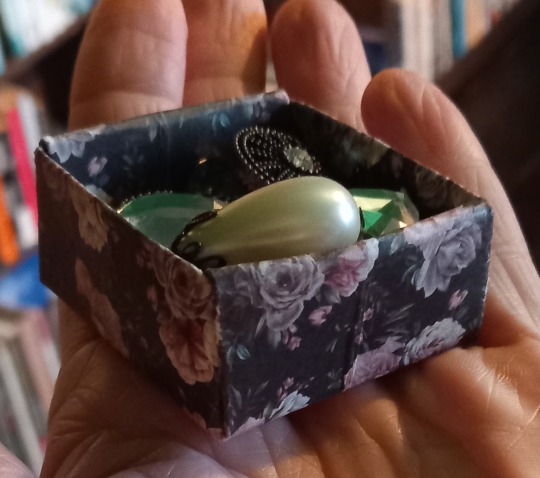
I also had a guide to a William Blake exhibition I'd been to, and since there was an entire plate from "The Marriage of Heaven and Hell" I had to make it into a miniature wall plaque.
I did this one at the same time as the first, and again you can kind of see that I oversatured the paper which caused it to tear slightly, however thankfully it wasn't in an area where there was any writing.
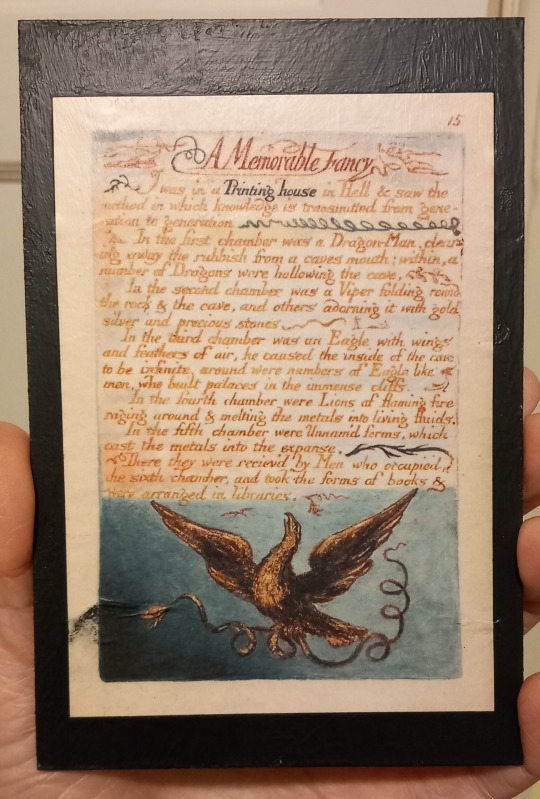
(BTW, if anyone is interested in the meaning of this section, Blake is describing his creative process, albeit in a fantastical way. This blog post gives a good analysis)
The next one was a beautiful little cabinet with a broken handle.
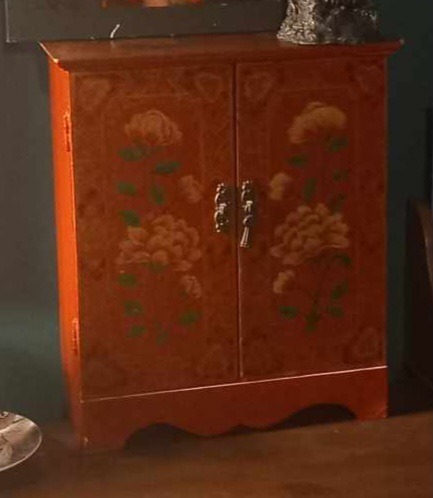
And here is what I did with it. I kept the collaging to a minimum, only on the inside, though I might add something to the outside in the future. The replacement "handles" are a pair of my earrings!
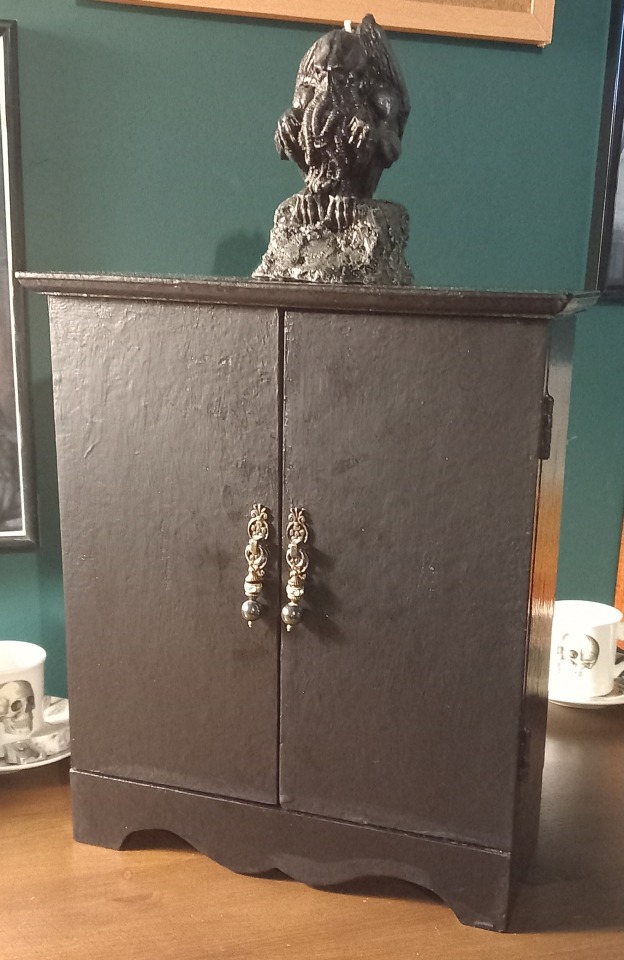
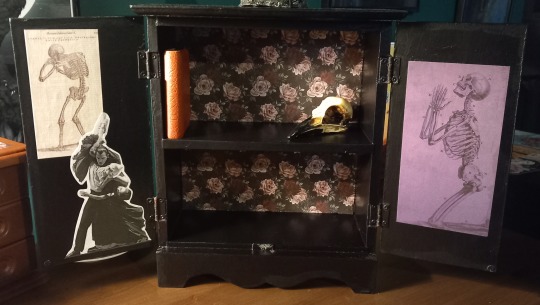
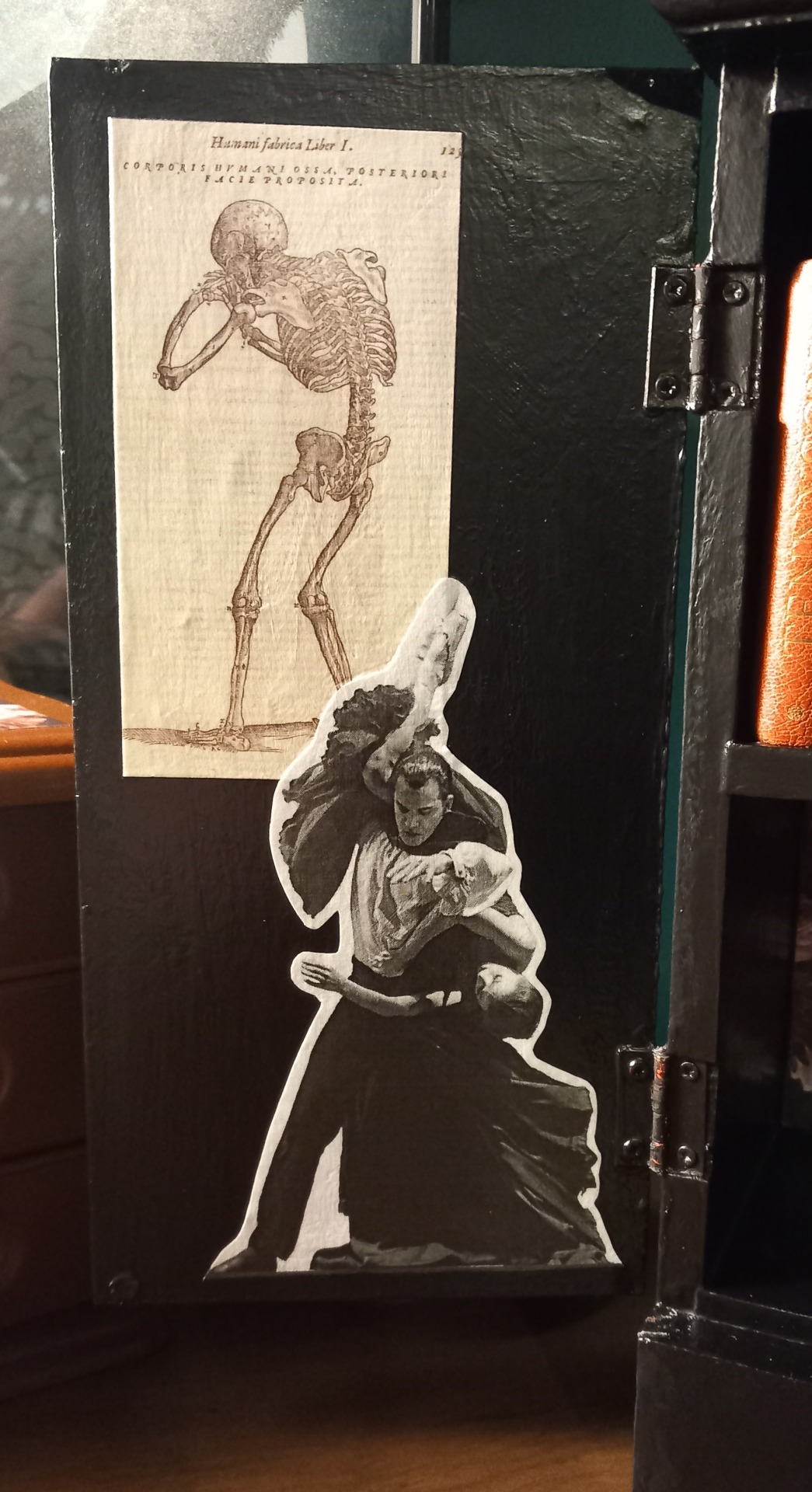
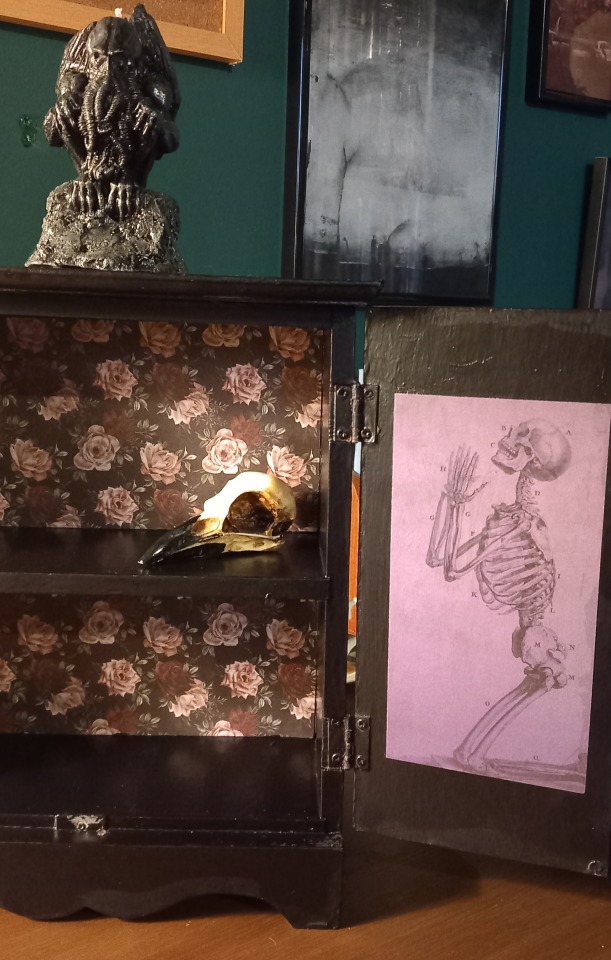
I used some more of the gothic exhibition guide and scrapbook paper, and also a flyer for a ballet version of Dracula. I need to find some more interesting things to fill it as it currently only contains my resin crow's skull and a miniature book of Tennyson poems. Also my Cthulhu candle gets to sit on top and be worshipped by the skeleton on the right door.
I did much better with the collaging process on this one. I was a lot more patient, used less Mod Podge for each layer and allowed them to dry fully in between, resulting in no tears, bubbles or creasing.
The final and most recent is this plain box. I noticed it originally came from somewhere called "Palmyra Hardware" which instantly made me think of the Palmyra Wolves (I'm a fan of MrBallen and saw him tell the story on his YouTube channel) which gives a pleasantly creepy angle to this one before I even did anything to it!
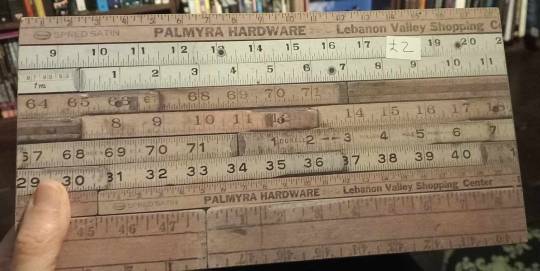
After collaging
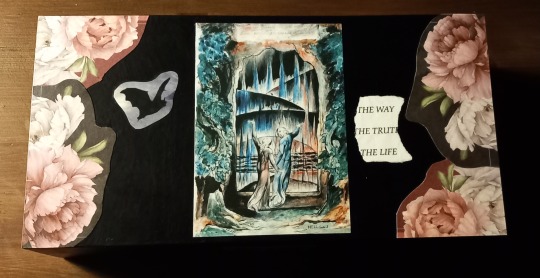
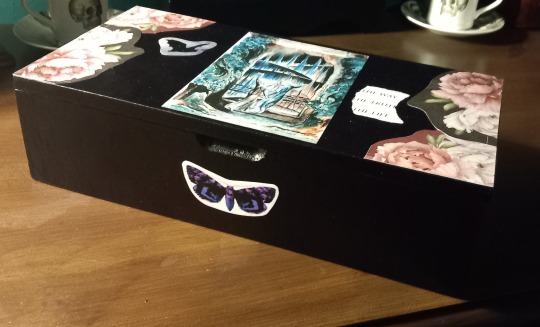
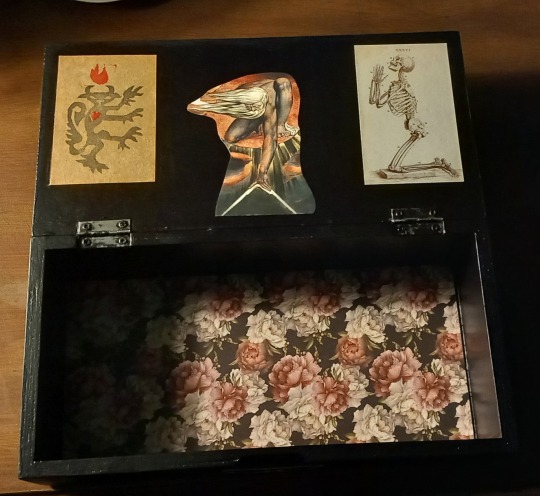
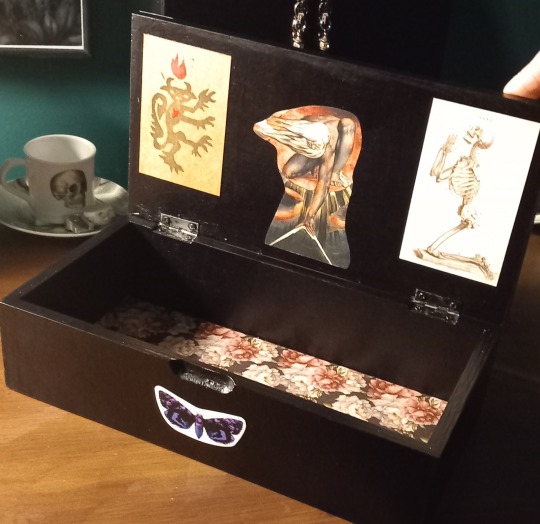
The central image on the outside is another William Blake painting, an illustration to Dante's Inferno, which includes the famous quote "Abandon All Hope, Ye Who Enter Here". The writing saying "The way, the truth, the life" came from a religious leaflet that a friend of mine was forcibly given, and which he ripped to shreds, but I saved this part because for some reason I liked it.
Inside we've got a very famous Blake painting called "The Ancient of Days", the praying skeleton again as this image was reproduced several times in that guidebook, and a block printed demon from a handmade birthday card that a friend gave me several years ago. I'm very pleased to have finally been able to use him for something!
I've enjoyed making all of these immensely and no doubt I will do more in the future as I collect more papers and find more nice boxes 😊
#collage#paper art#paper craft#decoupage#mod podge#goth diy#gothic#goth#gothic art#andreas vesalius#anatomical drawing#william blake#the marriage of heaven and hell#charity shop finds#thrifting finds#hand crafted#crafting#crowcore#corvidcore#ephemera#shiny things#shinies#origami#goth aesthetic#diy craft
29 notes
·
View notes
Text
I’ve hit 666 words in my essay comparing Paradise Lost and William Blake’s The Marriage of Heaven and Hell and I am leaving it there for today so Satan might bless my academic endeavours.
#hail satan#/j#I’m atheist I don’t believe in Satan#please don’t be weird about this post Christian’s#satan#satanic#satanism#666#english student#english literature#english courses#english essay#paradise lost#john milton#the marriage of heaven and hell#william blake
4 notes
·
View notes